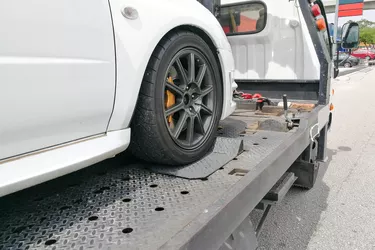
If you default on a car loan in New York, the lender can ask you to turn over the car at a mutually agreed upon place. The lender also has the right to disable or repossess the car, as long as it doesn't break any laws or disturb the peace to do it. Lenders don't need to get court orders before repossessing the vehicles, and they don't need to tell you about their repossession plans until after the fact.
This means a creditor can repossess your car the moment you default on the loan. Check your loan agreement for the definition of default that applies to your loan.
Video of the Day
Video of the Day
Required Notice in New York
Per the state's uniform commercial code, the lender must notify you of the repossession within 24 hours. The lender can show up in person or send a notice via first class mail. A notice also must go to the nearest motor vehicle district office, and it must contain the name and address of the entity that repossessed your car.
In addition, the notification must include a description of the car, information about you and the lender, and the amount that you owe. It also must inform you of the lender's plan to dispose of your car. Finally, it must advise you that you'll get an accounting of the unpaid balance on the car.
Companies Can't Breach the Peace
Although a repo company can take possession of your vehicle on both public and private property, they can't breach the peace. According to Upsolve, this means they can't enter your physical dwelling without consent, make threats or damage your property. So the company can remove the car from your driveway, but they can't cut a lock on a gate to get to the vehicle.
The Auction Block
The creditor can dismantle your car and sell the parts, or lease or auction it. Your permission isn't required to dispose of the car, but the creditor must tell you when and where they'll lease or auction it. The law states that the sale of repossessed vehicles must be commercially reasonable, which means the creditor can't sell your car for an exorbitant amount below its value.
If the creditor can't collect your loan's unpaid balance plus reasonable costs related to the repossession, the creditor can come after you for the uncollected amount.
There’s Still Time
If you've already paid more than 60 percent of the amount you owe when the car is repossessed, the creditor must auction it within 90 days. During this time, you can still get your car back, says the New York City Bar Legal Referral Service. You have up until the car is actually sold or leased to settle with the lender. You might have to pay the past due amounts, but often you'll be asked to pay the entire loan balance.
After the auction, the creditor can apply the proceeds toward fees and expenses relating to the repossession and the unpaid balance on the loan. The lender must give you a completed an Affirmation of Repossession and Bill of Sale. After all expenses are paid, you're entitled to the balance of the proceeds.